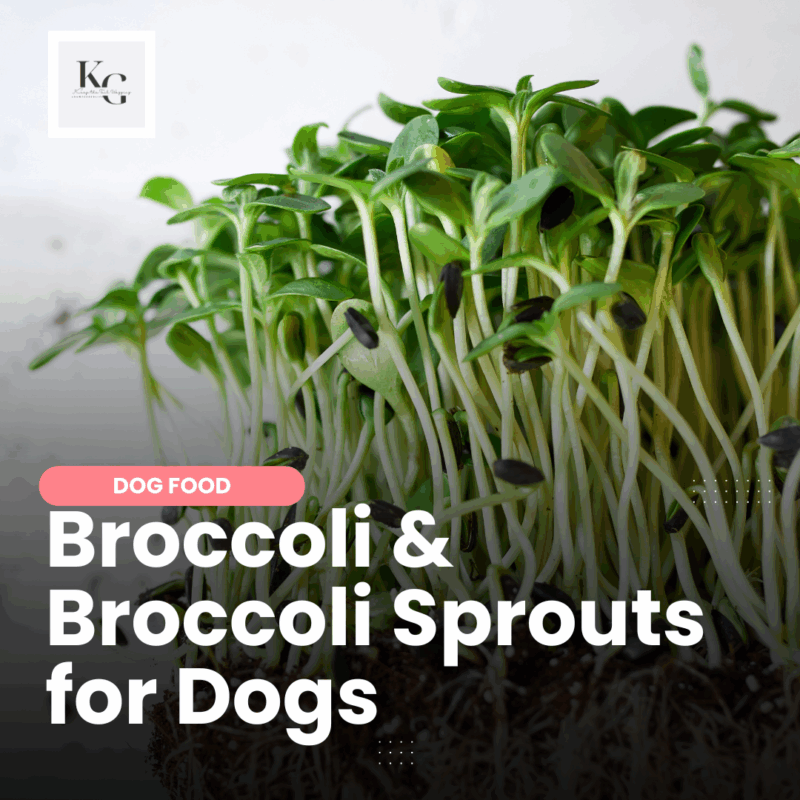Keep the Tail Wagging is supported by pet parents. I occasionally earn a commission (at no additional cost to you) when you click through an affiliate link to one of my favorite products. Thank you for your support. Read More
Broccoli and broccoli sprouts are more than just crunchy greens; they’re potent nutritional powerhouses for both humans and dogs. Packed with vitamins, minerals, and antioxidants, these cruciferous vegetables can support detoxification, immune function, and even help fight inflammation. But their true superpower? A compound called sulforaphane is found in exceptionally high concentrations in broccoli sprouts.
In this post, we’ll dive into the benefits of broccoli and broccoli sprouts for dogs, how to safely prepare and feed them, the proper dosage for different dog sizes, and when they’re best stored or gently dehydrated.
Benefits of Broccoli for Dogs
Broccoli is a cruciferous vegetable, along with collard greens, kale, bok choy, cauliflower, cabbage, and Brussels sprouts. It's a great source of fiber, vitamin C, vitamin K, iron, and potassium. It also boasts more protein than most other vegetables.
Nutrients in Broccoli
FIBER: supports gut health and aids in weight loss, and can be a great addition to the bowl for dogs that need to lose weight.
VITAMIN C: a powerful antioxidant that boosts the immune system, supports cardiac (heart) health, improves iron absorption, and supports cognitive health.
VITAMIN K: assists in creating the proteins necessary for blood clotting; it's used to prevent bleeding after surgery, metabolizes calcium in the bones, and Vitamin K therapy is often used to treat some poisoning.
IRON: supports healthy red blood cells, energy, digestive health, and the immune system.
POTASSIUM: is a vital nutrient that keeps the body moving. It regulates the heartbeat, keeps muscles and nerves healthy and working, and helps process protein and carbohydrates.
Why Broccoli and Broccoli Sprouts Are Good for Dogs
Broccoli (mature vegetable):
As stated above, broccoli is rich in fiber, vitamin C, vitamin K, potassium, calcium, and antioxidants like lutein and zeaxanthin. It supports…
- Detoxification via glucoraphanin, a precursor to sulforaphane
- Digestive health with its fiber content
- Immune function through its antioxidant compounds
- Bone health due to vitamin K and calcium
Broccoli sprouts (3–5 day-old seedlings):
Broccoli sprouts are baby plants harvested before the leaves open. They're 10–100x higher in sulforaphane than mature broccoli.
Sulforaphane is known for:
- Neutralizing carcinogens
- Reducing inflammation
- Supporting liver detox pathways
- Activating antioxidant responses at a cellular level
How to Prepare Broccoli for Dogs
- Lightly steam chopped broccoli to soften it and reduce goitrogens (which can interfere with thyroid function in large amounts).
- Let it cool completely before serving.
- Chop finely or puree to make digestion easier.
- Avoid seasoning or oils.
Feed in moderation — about 5–10% of your dog’s veggie portion.
- Effects of different cooking methods on health-promoting compounds of broccoli.
- Steam cooking significantly enhances the in vitro bile acid binding of collard greens, kale, mustard greens, broccoli, green bell peppers, and cabbage.
How to Grow and Feed Broccoli Sprouts
Growing Broccoli Sprouts (Easy At-Home Method)
- Soak 2 tablespoons of organic broccoli sprout seeds in filtered water for 8–12 hours.
- Drain and rinse seeds. Place in a sprouting jar or tray with drainage.
- Rinse and drain twice daily for 3–5 days, keeping them in a dark or low-light area.
- Once sprouted (about 1–2 inches), move to indirect sunlight for a few hours to green them up.
- Harvest when sprouts are 3–4 inches tall, usually on day 4 or 5.
Storage
- Keep broccoli sprouts in an airtight container in the refrigerator.
- Best used within 5–7 days.
- For longer storage, dehydrate at low temperatures (under 115°F) to preserve myrosinase and sulforaphane potential.
- Store dehydrated sprouts in a glass jar in a cool, dark place.
Broccoli Sprouts Shopping List
- Broccoli Sprouts Seeds
- Broccoli Sprouts Growing Kit (with jars, lids, and stands)
- Broccoli Sprouts Growing Kit (lids and stands only)
- Broccoli Seed Sprouting Kit (two-layer stand)
- Microgreen Grow Book – Becoming a Microgreen Master
Dehydrating Broccoli Sprouts
- When the sprouts are ready to harvest (ready to eat), line each dehydrator tray with parchment paper and evenly spread the sprouts on the paper.
- Dehydrate the sprouts for six to seven hours at 11o F (43.33 C).
- Grind the dehydrated sprouts into a powder and store them in a glass jar.
While dehydrating changes food, dehydrating food at low temperatures for a short time (closer to air-drying) has the least impact on the nutrient profile. It's essential to note that dehydrated broccoli sprouts have a limited shelf life and can develop mold if not used promptly (within a couple of weeks).
How Much Sulforaphane Do Dogs Need?
Sulforaphane content: 1 ounce (about ½ cup) of fresh broccoli sprouts = ~73 mg of sulforaphane
Target dosage per dog size:
- 5–25 lb dog → 250 mg
- 25–50 lb dog → 500 mg
- 50–100 lb dog → 1,000 mg
How much broccoli sprout does that mean?
| Dog Weight | Sulforaphane Needed | Amount of Sprouts | In Tablespoons |
|---|
| 5–25 lbs | 250 mg | ~3.5 oz | ~7 tbsp (or 0.5 cup + 3 tbsp) |
| 25–50 lbs | 500 mg | ~7 oz | ~14 tbsp (just under 1 cup) |
| 50–100 lbs | 1,000 mg | ~14 oz | ~28 tbsp (1 ¾ cups) |
Important Note: This amount is based on fresh broccoli sprouts. Dogs can benefit from smaller amounts, especially if you're feeding for maintenance rather than therapeutic support. Start small and gradually increase.
Using Broccoli Sprout Powder
If you’re using a broccoli sprout supplement, look for:
- Freeze-dried (NOT heat-dried) to preserve the enzyme myrosinase, which is essential for converting glucoraphanin into active sulforaphane. I recommend Youthful Grasses & Sprouts by Gussy’s Gut. This product is gently dehydrated at low temperatures to preserve the myrosinase.
- No fillers, additives, or synthetic preservatives
Always follow the manufacturer’s feeding guidelines or consult a holistic vet for therapeutic doses.
Downsides of Feeding Broccoli and Sprouts
While broccoli and sprouts are beneficial, overfeeding can cause issues:
- Gas and digestive upset – Cruciferous veggies can be hard on sensitive stomachs
- Goitrogens – In large amounts, raw broccoli may interfere with thyroid function
- Excess fiber – Can cause loose stools if introduced too quickly or in excess
- Spoilage risk – Sprouts must be stored properly to avoid mold or bacterial contamination
Always introduce gradually and monitor your dog’s reaction.
Broccoli Sprouts vs. Gussy's Gut
Broccoli and broccoli sprouts are powerful additions to a fresh food diet when fed correctly. Whether you're growing your own sprouts or using a high-quality powder, these greens can support your dog’s long-term health, detox pathways, and immune system.
I love growing sprouts – it's an easy and inexpensive process, creating in a potent, whole food supplement. I also use Youthful Grasses & Sprouts by Gussy's Gut, which contains four organic grasses (wheatgrass, barley, alfalfa, oat) and three organic sprouts (broccoli, alfalfa, cabbage).
Grasses and Sprouts for Dogs: Benefits Overview
1. Wheatgrass
- Rich in chlorophyll, enzymes, and antioxidants
- Supports detoxification and liver function
- Aids in digestion and may help with foul breath
- Contains vitamins A, C, E, and minerals like iron, calcium, and magnesium
2. Alfalfa Grass
- Natural anti-inflammatory; traditionally used for arthritis relief
- Source of vitamins A, D, E, K, and B-complex
- High in chlorophyll, which supports skin and coat health
- Mild diuretic effect; can help reduce fluid retention
3. Barley Grass
- Contains SOD (superoxide dismutase), a powerful antioxidant enzyme
- Rich in vitamin K, potassium, calcium, and iron
- Supports healthy cell function and immune regulation
4. Oat Grass
- Good source of B vitamins, iron, and magnesium
- Supports nervous system and calming functions
- Aids in digestion and can soothe upset stomachs
- Often used for its gentle cleansing properties
Whichever path you choose – growing your own broccoli sprouts or using a powder supplement like Youthful Grasses & Sprouts – moderation is key. Start small, observe, and choose organic, safe sources whenever possible.
Sprouts for Dogs: Benefits Overview
The benefits of broccoli sprouts are noted above; Youthful Grasses & Sprouts also contains cabbage sprouts and alfalfa sprouts:
5. Cabbage Sprouts
- High in glucosinolates, which support detoxification pathways
- Contains sulforaphane (less than broccoli, but still present)
- Supports gut health and has anti-inflammatory properties
- May help with ulcer prevention due to glutamine content
6. Alfalfa Sprouts
- Nutrient-dense, with phytoestrogens, vitamins A, C, E, and K
- Supports detoxification, inflammation control, and urinary tract health
- Can help support dogs with seasonal allergies
- Caution: Use in moderation—rich in plant compounds that can interact with hormones
Broccoli Sprouts (for comparison)
- Highest in sulforaphane, a potent compound that activates detox pathways, reduces inflammation, and protects against cancer
- Stimulates Nrf2 pathway: Nrf2 is like a tiny switch inside your dog’s body that turns on its natural defense system. When it’s activated (by foods like broccoli sprouts), it helps protect cells, clean up toxins, and keep the body strong and healthy.
- Strong antioxidant, anti-cancer, and anti-inflammatory properties
Broccoli Sprouts vs. Organic Fermented Grasses & Sprouts
| Feature | Broccoli Sprouts (Fresh, Raw) | Organic Fermented Grasses & Sprouts |
|---|---|---|
| Sulforaphane Content | ⭐️⭐️⭐️⭐️⭐️ Extremely high (up to 100x more than mature broccoli) | ⭐️ Moderate (contains some sulforaphane, especially from cabbage/broccoli sprout inclusion) |
| Bioavailability | ⭐️⭐️ Requires active myrosinase (must be raw) | ⭐️⭐️⭐️⭐️⭐️ Enhanced through fermentation; nutrients are pre-digested and easier to absorb |
| Nutrient Variety | ⭐️⭐️ Focused on sulforaphane and some antioxidants | ⭐️⭐️⭐️⭐️⭐️ Diverse; chlorophyll, B vitamins, minerals, enzymes, phytonutrients |
| Gut Health Support | ⭐️⭐️ Mild (raw fiber, sulforaphane) | ⭐️⭐️⭐️⭐️⭐️ Excellent; supports microbiome, includes probiotics and prebiotics |
| Antioxidant Activity | ⭐️⭐️⭐️⭐️ Strong via sulforaphane/Nrf2 activation | ⭐️⭐️⭐️⭐️⭐️ Broad; SOD (superoxide dismutase), chlorophyll, and other antioxidant enzymes |
| Detoxification | ⭐️⭐️⭐️⭐️⭐️ Sulforaphane activates Phase II detox enzymes | ⭐️⭐️⭐️⭐️⭐️ Broad detox support; includes sulfur compounds, chlorophyll, and fermented enzymes |
| Digestive Support | ⭐️⭐️ Mild | ⭐️⭐️⭐️⭐️⭐️ Strong; fermentation + high fiber + enzymes ease digestion |
| Inflammation Support | ⭐️⭐️⭐️⭐️ Excellent via sulforaphane | ⭐️⭐️⭐️⭐️⭐️ Multiple compounds reduce inflammation (chlorophyll, SOD, polyphenols) |
| Immune Support | ⭐️⭐️⭐️⭐️ Good (immune cell regulation) | ⭐️⭐️⭐️⭐️⭐️ Excellent; includes gut-immune axis support via probiotics and diverse plant nutrients |
| Shelf Stability | ⭐️ Short (must be eaten within 5–7 days fresh) | ⭐️⭐️⭐️⭐️⭐️ Long (shelf-stable, easy to store), gently dehydrated (at low temps) to preserve enzymes and active compounds |
| Convenience | ⭐️⭐️ Requires home growing or sourcing | ⭐️⭐️⭐️⭐️⭐️ Easy; measured, ready-to-feed powder or supplement |
Supplement or Fresh Broccoli Sprouts?
- Broccoli sprouts are the richest source of sulforaphane, making them an ideal choice for targeted detoxification and cancer prevention.
- A blend of grasses and sprouts offers complementary nutrients and benefits, supporting digestion, immune function, and inflammation.
- Combining both may provide the most balanced, holistic support: broccoli sprouts for potent cellular protection, and the mix for broader nutritional synergy.







The more I learn about my dogs’ health and supplements, the more I question the powder supplements in place of fresh food. Broccoli sprouts are so easy to grow, and I believe they are best given/eat fresh instead of in a supplement. I ordered my seeds and a kit from Amazon. I began adding them to my dogs’ meals a few months ago. I’ve noticed that Rodrigo’s mobility has improved (broccoli sprouts have anti-inflammatory properties). But I know what you mean; when you have healthy dogs, it’s hard to tell if our actions are working.
I give my dog a fermented broccoli sprout supplement from Dr. Mercola.
I’ve not noticed anything different in her but I guess that’s the point.